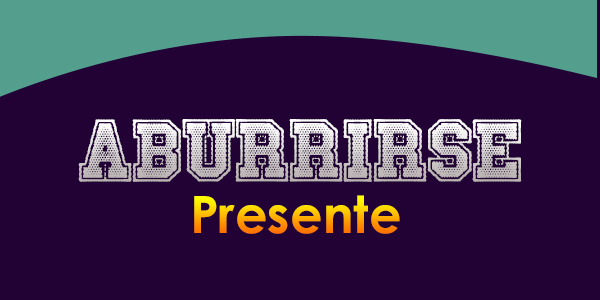Have you ever found yourself staring blankly at a wall, feeling an overwhelming sense of emptiness? Perhaps you’ve even uttered the words, “I’m bored,” in Spanish, “Estoy aburrido.” The verb “aburrirse” is more than just a synonym for “being bored.” It’s a verb that encapsulates a state of mind, an experience shared by all humans, and its conjugation unlocks a deeper understanding of this common emotion.

Image: www.slideshare.net
In Spanish, “aburrirse” is a reflexive verb, meaning the action reflects back on the subject. This means we use the reflexive pronoun “se” along with the verb to express the feeling of boredom. But how exactly do we conjugate this verb? Understanding the conjugation of “aburrirse” can elevate your Spanish skills and enrich your vocabulary about this universal human experience.
The Foundations of Aburrirse
Before diving into the conjugation, let’s first understand the basics of “aburrirse.”
- Reflexive construction: “Aburrirse” is a reflexive verb, requiring the use of the reflexive pronoun “se.” This pronoun reflects the action back on the subject, emphasizing the person experiencing the boredom.
- Stem: The stem of “aburrirse” is “aburrir.”
- Conjugations: Spanish verbs have different conjugations based on the tense, mood, and person.
Unveiling the Conjugation of Aburrirse
Now, let’s explore the conjugation of “aburrirse” in different tenses, revealing the nuances of this remarkable verb.
Present Tense
The present tense is used to express actions happening now. The conjugation of “aburrirse” in the present tense is:
| Person | Singular | Plural |
|---|---|---|
| Yo | me aburro | nos aburrimos |
| Tú | te aburres | os aburrís |
| Él/Ella/Usted | se aburre | se aburren |
Here, you’ll notice that the se remains consistent, while the verb “aburrir” conjugates to reflect the subject.
Example:
- “Yo me aburro en clase.” (I get bored in class.)
- “Ustedes se aburren demasiado en la fiesta.” (You all are too bored at the party.)

Image: www.spanishcircles.ca
Preterite Tense
The preterite tense is used for actions that were completed in the past. The conjugation of “aburrirse” in the preterite tense is:
| Person | Singular | Plural |
|---|---|---|
| Yo | me aburrí | nos aburrimos |
| Tú | te aburriste | os aburristeis |
| Él/Ella/Usted | se aburrió | se aburrieron |
Example:
- “Me aburrí mucho en la película.” (I was very bored during the movie.)
- “Ellos se aburrieron en el museo.” (They got bored at the museum.)
Imperfect Tense
The imperfect tense describes ongoing actions in the past. The conjugation of “aburrirse” in the imperfect tense is:
| Person | Singular | Plural |
|---|---|---|
| Yo | me aburría | nos aburríamos |
| Tú | te aburrías | os aburríais |
| Él/Ella/Usted | se aburría | se aburrían |
Example:
- “Me aburría mucho en la escuela.” (I used to get bored a lot in school.)
- “Ellas se aburrian en el jardín.” (They used to get bored in the garden.)
Future Tense
The future tense is used to express actions that will happen in the future. The conjugation of “aburrirse” in the future tense is:
| Person | Singular | Plural |
|---|---|---|
| Yo | me aburriré | nos aburriremos |
| Tú | te aburrirás | os aburriréis |
| Él/Ella/Usted | se aburrirá | se aburrirán |
Example:
- “Me aburriré si no hay nada que hacer.” (I will get bored if there’s nothing to do.)
- “Se aburrirán si no hay comida.” (They will get bored if there’s no food.)
Conditional Tense
The conditional tense is used to express hypothetical situations. The conjugation of “aburrirse” in the conditional tense is:
| Person | Singular | Plural |
|---|---|---|
| Yo | me aburriría | nos aburriríamos |
| Tú | te aburrirías | os aburríais |
| Él/Ella/Usted | se aburriría | se aburrirían |
Example:
- “Me aburriría si tuviera que trabajar aquí.” (I would get bored if I had to work here.)
- “Ellos se aburrirían si no hubieran traído juegos.” (They would get bored if they hadn’t brought games.)
Navigating the Nuances of Aburrirse
Let’s delve deeper into the nuances of “aburrirse” with some common phrases:
- Estar aburrido/a: This means “to be bored.” You use this when describing your current state of boredom.
- Aburrirse de algo: This means “to get bored of something.” This phrase is used to express the feeling of boredom as a result of an activity or an object.
- No aburrirse: Literally meaning “not to be bored,” this phrase describes a state of being entertained, engaged, or excited.
Actionable Tips for Mastering Aburrirse
Now, let’s put your “aburrirse” knowledge into action! Here are some tips to help you master this verb:
- Practice conjugating: Make flashcards for each tense and conjugation to aid in memorization.
- Use real-world examples: Replace the example sentences with your own experiences to make the conjugation more meaningful.
- Engage in conversation: Try using “aburrirse” in conversations with Spanish speakers to solidify your understanding.
Conjugation Of Aburrirse
Conclusion
By mastering the conjugation of “aburrirse,” you not only expand your Spanish vocabulary but also gain a deeper appreciation for the art of getting bored. It’s a universal emotion that transcends language barriers. So, next time you find yourself experiencing this common feeling, remember the power of “aburrirse” and embrace its nuances.
Ready to share your own stories of boredom? Engage with the Spanish community, dive deeper into the complexities of this emotion, and explore the numerous ways “aburrirse” enriches our lives. Remember, the journey of language learning is a continuous adventure. Keep exploring, keep growing, and keep getting curious!






